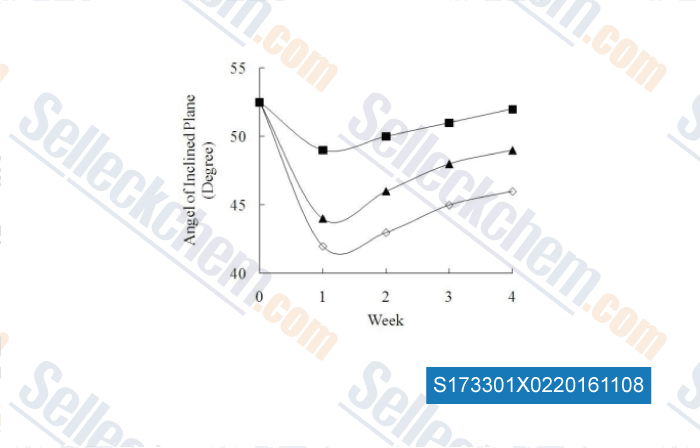|
Toll Free: (877) 796-6397 -- USA and Canada only -- |
Fax: +1-832-582-8590 Orders: +1-832-582-8158 |
Tech Support: +1-832-582-8158 Ext:3 Please provide your Order Number in the email. |
Technical Data
| Formula | C22H30O5 |
|||
| Molecular Weight | 374.47 | CAS No. | 83-43-2 | |
| Solubility (25°C)* | In vitro | DMSO | 75 mg/mL (200.28 mM) | |
| Ethanol | 19 mg/mL (50.73 mM) | |||
| Water | Insoluble | |||
|
* <1 mg/ml means slightly soluble or insoluble. * Please note that Selleck tests the solubility of all compounds in-house, and the actual solubility may differ slightly from published values. This is normal and is due to slight batch-to-batch variations. * Room temperature shipping (Stability testing shows this product can be shipped without any cooling measures.) |
||||
Preparing Stock Solutions
Biological Activity
| Description | Methylprednisolone is a synthetic glucocorticoid receptor agonist, used to achieve prompt suppression of inflammation. Methylprednisolone activates ACE2 and reduces IL-6 levels, thus improves severe or critical COVID-19. Methylprednisolone markedly reduces autophagy and apoptosis. | |
|---|---|---|
| Targets |
|
|
| In vitro | Methylprednisolone (2-10 mg/kg) markedly inhibits TNF production but does not affect serum levels of IL-10, while a high methylprednisolone dose (50 mg/kg) increases LPS-induced IL-10 levels. Methylprednisolone(from 0.01 to 100 mg/mL) also increases the biosynthesis of IL-10 by LPS-activated mouse peritoneal macrophages. [1] |
|
| In vivo | Methylprednisolone decreases RGC survival in rats with electrophysiologically diagnosed optic neuritis. Methylprednisolone decreases RGC survival by a nongenomic, calcium-dependent mechanism. Methylprednisolone-induced enhancement of RGC degeneration depends on calcium influx through voltage-gated calcium channels. [2] Methylprednisolone treatment leads to a significant decrease in the number of ED1-positive cells in both rostral and caudal stumps. Methylprednisolone treatment results in a significant reduction in tissue loss in both cord stumps at 2, 4 and 8 week post-injury. Methylprednisolone leads to a long-term reduction of ED1-positive cells and spinal tissue loss, reduced dieback of vestibulospinal fibres, and a transient sprouting of vestibulospinal fibres near the lesion at 1 and 2 weeks post-lesion. [3] Methylprednisolone at a dose of 30 mg/kg which has been shown to be effective in improving functional outcomes in rat SCI models, suppresses TNF-α expression and NF-kB activation. Methylprednisolone inhibition of NF-kB function is likely mediated by the induction of IkB, which traps NF-kB in inactive cytoplasmic complexes. [4] |
Protocol (from reference)
References
Customer Product Validation

-
Data from [Data independently produced by , , Trop J Pharm Res, 2014, 13 (1): 53-59.]
Selleck's Methylprednisolone has been cited by 3 publications
| High-throughput liquid chromatography tandem mass spectrometry assay as initial testing procedure for analysis of total urinary fraction [ Drug Test Anal, 2020, 10.1002/dta.2917] | PubMed: 32852861 |
| Glucocorticoid hormone-induced chromatin remodeling enhances human hematopoietic stem cell homing and engraftment. [ Nat Med, 2017, 23(4):424-428] | PubMed: 28263313 |
| Salvianolic Acid B Ameliorates Motor Dysfuntion in Spinal Cord Injury Rats. [C Xun, et al. Trop J Pharm Res, 2014, 13 (1): 53-59] |
RETURN POLICY
Selleck Chemical’s Unconditional Return Policy ensures a smooth online shopping experience for our customers. If you are in any way unsatisfied with your purchase, you may return any item(s) within 7 days of receiving it. In the event of product quality issues, either protocol related or product related problems, you may return any item(s) within 365 days from the original purchase date. Please follow the instructions below when returning products.
SHIPPING AND STORAGE
Selleck products are transported at room temperature. If you receive the product at room temperature, please rest assured, the Selleck Quality Inspection Department has conducted experiments to verify that the normal temperature placement of one month will not affect the biological activity of powder products. After collecting, please store the product according to the requirements described in the datasheet. Most Selleck products are stable under the recommended conditions.
NOT FOR HUMAN, VETERINARY DIAGNOSTIC OR THERAPEUTIC USE.
